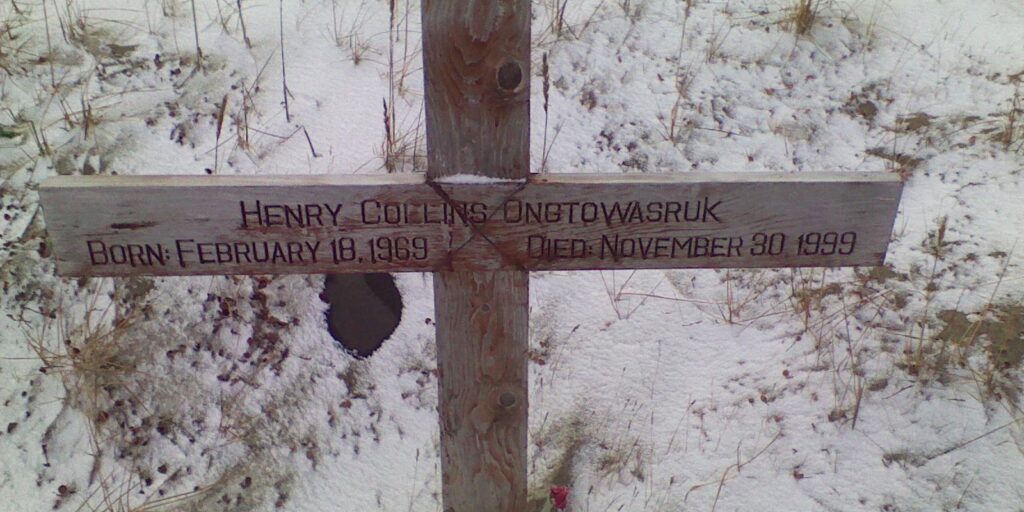Arlene Soxie lives in Nome, and she remembers her son Henry Ongtowasruk growing up.
“He was a happy person,” she said. “He was very bright. And real quick, he had a real quick mind that could figure things out.”
Arlene said she remembers Henry as a young boy; always outside, where he was happiest.
“When he was a very young child he and his younger brother and his other friends would go out camping, in the spring time,” she recalled. “They would go out hunting … [and] they took very little with them. They would catch ducks and they would roast outside and they did … survival things. They were learning how to survive out in the wilderness.”
Arlene’s memories of Henry are frozen in 1999, after he moved to Anchorage as a young man. When he was just 30 years old, Henry was found dead in his motel room, strangled. Arlene insisted on visiting the motel, to see where her son was killed.
“There was a detective that called me. And I requested of him to see the place where he had died. He said it was not a normal thing that they do, but he would see if he could arrange it. And I went down to see where he did pass away.
“Just a little tiny room,” Arlene sighed. “And the manager left it the way it was. He told the detective he favored Henry. He liked him. And he allowed him to come and drink coffee whenever he wanted to, even if it was early in the morning.”
Henry’s killer was never caught. But in February, after nearly 15 years of silence, Arlene said she heard news of the man who may have killed her son.
“One of the detectives was talking to Joshua Wade,” Arlene said, “and he confessed that he was the one that killed my son.
“And it was like he … like he died all over again,” Arlene said. She looked off in the distance, looking far away at nothing, fighting tears.
In Anchorage on Friday June 20, investigators with the Anchorage Police Department and the FBI said they are now investigating claims of previously unknown killings by convicted killer Joshua Wade. In 2009, Wade pleaded guilty to the 2007 killing of Mindy Schloss; he also admitted to the 2000 murder of Della Brown.
APRN’s Josh Edge reports investigators said that, earlier in 2014, Wade told them about three other murders he claims to have committed, including the killing of Henry Ongtowasruk in 1999. Now they’re looking with fresh eyes at old evidence.
“We keep evidence in every homicide case, forever,” said APD Detective Sergeant Slav Markiewicz at Friday’s press conference. “We don’t dispose of the evidence. There are new advances in technology, DNA; we may analyze the evidence now in ways that we were not able to do in 1994 or in 2000.”
Beyond Henry Ongtowasruk, investigators said Wade’s claims could also be connected with the murder of 38-year-old John Michael Martin in 1994, as well as a third, as-yet-unidentified man allegedly killed the same night in 2000 that Wade killed Della Brown.
Investigators said Wade gave law enforcement officers details on the additional killings in exchange for transferring him to a federal prison outside Alaska.
“He doesn’t get out of jail. I don’t really care what his motivation is, I just care that he never gets out,” said U.S. Attorney for the District of Alaska Karen Loeffler.
Loeffler said letting Wade spend the rest of his life behind bars in another state was an easy choice, if it means finally putting three unsolved murders to rest.
“He’s not getting anything that harms the community from us,” she continued, “so if we can get some closure to someone, our position was, work with the Department of Law, see what they want.”
But in Nome on Friday, Arlene Soxie said hearing about the connection to Wade back on February at first made her hopeful—a feeling that dissipated after hearing that her son’s alleged killer bargained information to get something he wanted.
“It angered me,” Arlene said. “My son can’t speak for himself. And to know that people in the governing system, or the law, allow things like that, it’s … it’s not right either.”
Investigators are now trying to corroborate Wade’s claims, and it was still unclear Friday whether he could face new charges. That, Arlene said, is not the justice her son deserves.
“I was wishing that there would have been a trial for the murder of my son. And I was told that there would be no trial because he’s in prison already,” she said.
“It seems like the law is for the people who have committed the crime and not for the family members who are left suffering.”
Whether Wade’s claims to the additional murders prove true or false, it seems he got what he wanted: he’s been transferred to a maximum-security federal prison in Indiana, where he will serve out the remainder of his life sentence without the possibility of parole.
As for what Arlene and her family want—justice, a sense of closure—that’s far less certain.
“I could feel for the other family members, because this is something that does not go way,” Arlene said, straining for words. “And even if he did confess, it doesn’t make me feel better. It doesn’t.”
APRN’s Joshua Edge and KTUU’s Mallory Walser contributed information to this story.







